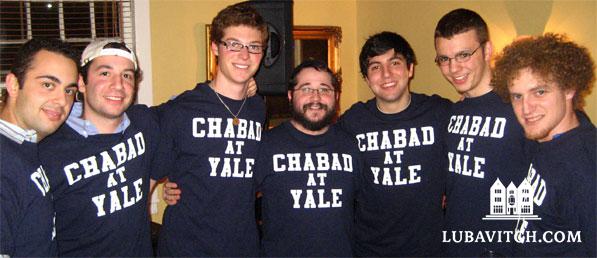(lubavitch.com) Until the early 1960’s, Yale University employed a quota restricting Jewish enrollment to about ten percent. Jewish students were barred from joining fraternities, marginalized in organizations and forced to hide their identities in order to gain acceptance in academic circles.
In his book, Joining the Club: a History of Jews and Yale, Dan A. Oren documents an earlier Yale where anti-Semitism and discrimination against its Jewish students were rife. One document from university archives mentioned in the book, labeled “Jewish Problem” contains a memo from the admissions chairman of 1922 urging limits on “the alien and unwashed element.” After the “Limitation of Numbers” policy was enacted in the next year, Jewish enrollment was held at ten percent for next four decades.
But today, Jewish life at Yale University is vibrant and growing rapidly, and the faculty embraces religious diversity and meritocracy. This past Chanukah, Rabbi Shua Rosenstein of Chabad at Yale launched a five-year $6 million dollar capital campaign to renovate an 9,000 square foot building located less than a block away from campus, to accommodate the organization’s Friday night dinners, classes and a host of other services for the university’s 2,000 Jewish students, who represent 25 percent of Yale’s student population.
Board member and campaign chairman Brad Berger graduated Yale in ’77, only a few years after the quota was retracted, when Jewish life was scant and mostly nonexistent.
“The engine and the magic of Chabad at Yale is Friday night. It’s such a shame that students are being turned away because 80 students fill the room every Shabbat and it’s standing room only,” Berger says. “So much has changed since I attended Yale, and I loved the idea to combine Judaism and Yale, so now I decided to help Rabbi Rosenstein with the building campaign.”
Founded in 2002, Chabad at Yale had a humble beginning in a one bedroom apartment. In her sophomore year in 2002, Jillian Merns, one of the founders of Chabad at Yale, started going to Friday night meals, squeezing into a tiny room for an inspiring and uplifting dinner with nine other students.
“By the end of that year we had 40 students attending every Shabbat,” says Merns, now an attorney in Manhattan. “Today, I engage in fundraising and personally reach out to others to support Chabad.”
The new building will serve as a comprehensive Jewish center while retaining the warm, home-away-from-home ambience that students find so welcoming. The charming exterior will remain as is, and Berger points out that the interior designing will also be loyal to the goal of maintaining the homey feel.
A dramatic, art adorned entry floor will open to a synagogue, library, conference room. At triple the size of the dining room of the current Chabad center, the dining facility on the second floor will accommodate the growing number of students at Shabbat dinners, while the third floor will house a student lounge and hotel suites for visiting speakers, parents and alumni.
Rabbi Rosenstein sees the new building “as a way for us to accommodate our exponential growth, and expand both quantitatively qualitatively. Physically, he says, it will be able to hold more students, and academically, “we will able to hold lectures, classes and a variety of events with greater ease.”
That will soon become a reality, explains Berger. With a donor base of alumni and parents of past and present students, Berger projects that building may begin in late summer or early fall next year, when he hopes to have reached fifty or sixty percent of their goals.
Now in his senior year, Zachary Fuhrer, says he looks forward to returning to Yale after he graduates to see the new premises for himself. Zachary is the President of Chabad at Yale. “I could see myself coming back and telling the new guys about how I was once in this cramped building, singing songs with Rabbi Rosenstein on Friday night,” he laughs.
It’s a change in climate at Yale University, where an alumnus in 1927 once complained to associate treasurer and comptroller Thomas W. Farnham that his contributions were being used to educate “Yids.” Farnham wrote back: “It will interest you to know that we are making every effort to remedy the condition.”
Ziba Razinia, 29, originally from Iran, is working on a PhD in biology.
“Now my family lives out in Los Angeles, and for me Chabad is like a second home. In Iran there was a lot of oppression, here I feel privileged to be part of Chabad, it’s a welcoming place and a great support.”

Be the first to write a comment.